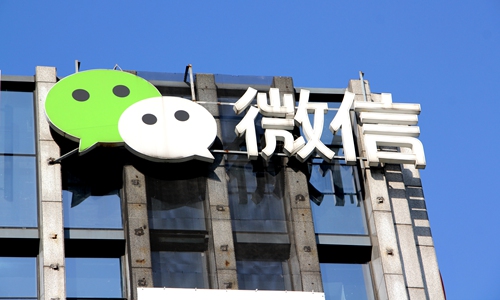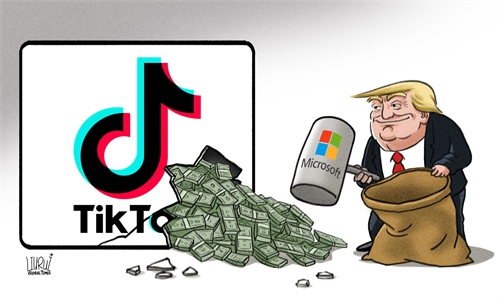US’ rising tech war targets WeChat
Politicizing economic issues an old trick, beyond reasonable boundaries

WeChat. Photo: IC
Tencent Holdings, one of the largest tech firms in the world based in China, has now become another target of Washington.
US President Donald Trump issued an executive order on Thursday that, saying beginning 45 days after the date of the order, the US would prohibit any transaction related to WeChat by any person or involving any property, subject to the jurisdiction of the US.
Although the market share of popular messaging app WeChat in the US is limited, analysts said the US ban of WeChat is part of a larger war on China's tech industry, as Tencent, which made WeChat, is one of the largest tech firms in the world and represents China's technology prowess.
Trump's move came along with another ban on Chinese-owned short video platform TikTok, which has been in the spotlight for days amid escalating tensions between the top two economies.
"This is an extension of the trade war between China and the US," Chen Da, executive director of Anlan Capital, told the Global Times on Friday.
"It is a political game, which will have a negative impact on Chinese internet companies going abroad. Chinese companies need to be vigilant about whether other countries will follow the US and block Chinese apps," Chen said.
A Tencent spokesperson told the Global Times the company is reviewing the executive order to get a full understanding.
As one of the most popular Chinese messaging apps, WeChat provides a range of services, including instant messaging and money transactions.
It started its move into overseas markets in April 2012, and invited football superstar Lionel Messi as the spokesperson for its overseas version in July 2013, which showed that WeChat had great confidence in the US market.
However, insiders suggested that since the market in the US is shared by players such as WhatsApp, Messenger, Skype and Line, WeChat found it hard to win a significant market share initially, unlike its booming performance in China.
US-based data provider Statista said in a survey in September 2019 that WeChat did not rank in the 10 most popular social media applications in the US, but was near the bottom. The three most popular apps were Facebook, Instagram, and Facebook Messenger.
In fact, the usage rate of WeChat in the US is only 0.79 percent, but had 1.2 billion active users worldwide as of March 31, most of whom are Chinese.
Tencent's Hong Kong shares closed lower on Friday, down 5.04 percent to HK$527.50 ($75.83), dragging down its market value to HK$5.05 trillion.
Insiders claimed that the biggest pain will be felt by overseas Chinese users and those who have business operations in China.
"I have lived in the US for six years and as I have observed, WeChat has a very large number of overseas Chinese users--almost all use it. Americans who have business relations with China also use it," a white-collar employee in Beijing, surnamed Wang, told the Global Times on Friday.
The Chinese-American population was estimated at 5.08 million in 2016, making it the largest Asian-American group in the US, according to a revised report released by the US Census Bureau in 2018.
"Cracking down on China is a continued national policy of the US; blocking tech companies is definitely part of its plan," Chen said.
Analysts said the ban serves Trump's reelection bid, as his campaign is at a critical moment, and he needs to make "big news" to woo his votes or distract them from domestic problems.
He has done what he can to divert attention, regardless of the consequences, so that he gets the votes, Shen Yi, a professor of international politics at Fudan University in Shanghai, told the Global Times on Friday.
Trump's strategy is to create external tensions, which have harmed the regional security order and the US' own mid- and long-term interests, thereby adding greater uncertainties to the international community. This behavior is beyond the reasonable boundaries of the US, Shen added.
Chinese Foreign Ministry spokesman Wang Wenbin urged the US to stop politicizing economic issues, saying the US will eventually feel the impact of overriding market principles and international rules.


